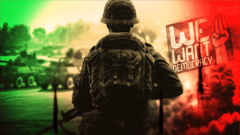The recent Israeli attacks on Iran have put Tehran in a precarious position, balancing the risks of retaliation against the reality of its weakened military and struggling economy. While Iranian leaders seem to avoid escalating tensions, the pressure from allies and domestic factions may compel a different response.
Iran's Strategic Dilemma: To Retaliate or Not After Israeli Strikes

Iran's Strategic Dilemma: To Retaliate or Not After Israeli Strikes
In the wake of Israeli military strikes, Iran faces a critical choice as it navigates the complexities of regional power dynamics and internal pressures.
In the aftermath of Israeli strikes, Iran is reportedly entangled in a multifaceted crisis that tests the limits of its strategic response. Iranian leaders are grappling with the implications of potential retaliation against Israel, which comes at a time when the nation's economy faces significant difficulties, military capabilities are stretched thin, and the political landscape undergoes transformations in light of leadership succession discussions.
Since the violent Hamas-led incursion into Israel on October 7, 2023, the Israeli military has launched extensive operations to diminish not only the Hamas presence in Gaza but also the networks of Iranian-supported groups, such as Hezbollah, the Houthis, and various factions in Syria and Iraq. These developments are critical to Iran's national defense strategy, seen as a buffer against Israeli aggression.
In the wake of the recent Israeli offensive, Iranian responses have struck a tone of restrained rhetoric. State media downplayed the repercussions of the assault and maintained regular broadcasts, avoiding an immediate vow for significant retaliation. Nevertheless, Iranian officials have reiterated their right to respond, showcasing the precarious tightrope that Tehran must walk.
By refraining from immediate counteractions, Iran seeks to avoid a confrontation that could escalate involvement from other regional players. Yet, the suppression of any robust response could fuel perceptions of weakness, undermining Iran's stance among its regional allies and potentially empowering more hawkish voices at home.
Since the violent Hamas-led incursion into Israel on October 7, 2023, the Israeli military has launched extensive operations to diminish not only the Hamas presence in Gaza but also the networks of Iranian-supported groups, such as Hezbollah, the Houthis, and various factions in Syria and Iraq. These developments are critical to Iran's national defense strategy, seen as a buffer against Israeli aggression.
In the wake of the recent Israeli offensive, Iranian responses have struck a tone of restrained rhetoric. State media downplayed the repercussions of the assault and maintained regular broadcasts, avoiding an immediate vow for significant retaliation. Nevertheless, Iranian officials have reiterated their right to respond, showcasing the precarious tightrope that Tehran must walk.
By refraining from immediate counteractions, Iran seeks to avoid a confrontation that could escalate involvement from other regional players. Yet, the suppression of any robust response could fuel perceptions of weakness, undermining Iran's stance among its regional allies and potentially empowering more hawkish voices at home.




















